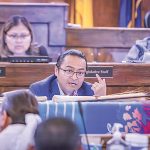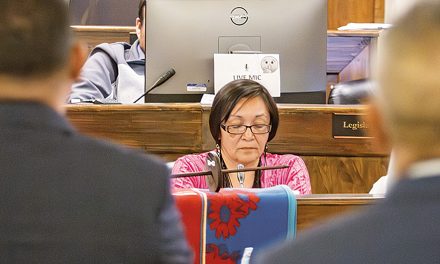
Sustainability and the ESG model: A Navajo Nation requisite for economic sovereignty
By Lydelle Davies
and Anthony Martinez
The purpose of this article is to stress the importance of the sustainability and environmental, social and governance (ESG) movement in the investor and corporate world today.
In particular we wish to emphasize how the principles and values of ESG are applied to the way the Navajo Nation government, the Navajo economy and other entities do business.
In its true essence, the $1.86 billion the Navajo Nation has received from the federal government is an investment by the American taxpayer, including the Dineh, to advance the economic sovereignty of the Nation as greatly impacted by the COVID-19 pandemic. Leverage advantage: Navajo Nation.
ESG as an acronym stands for the three words: environmental, social and governance.
For 30 years or so, the terms corporate social responsibility, community relations and ethical compliance have intersected the business world with intentions to convey the message of caring for meaningful interests beyond simply making a profit.
This expression of community stewardship has taken on several dimensions, depending on the interests of executives and their boards of directors.
In major cities throughout the United States, supporting the arts and nonprofit organizations has been a favorite way to contribute to such communities.
Unfortunately, rural areas such as those that exist in the Navajo Nation have been too often missed.
An important distinction is how the authors interpret the “e” in ESG is worthy of note. It’s simply too easy to say the “e” stands for consideration of only the environment.
To make it more complete, particularly as it applies the Nation and Indian Country, the “e” should be defined in terms of five “e’s,” or environmental, economic, education, equity and ethics.
Some people might argue that the last three “e’s” can be covered under the “s” or “g” in ESG. We disagree.
In the case of the Navajo Nation, it’s best to expand the typical meaning of “e” in ESG and identify essential areas, that need focus in the overall economic development of the Navajo Nation.
This expansive definition is more appropriate for the Nation because it aligns more closely with Navajo philosophy and cultural view that everything is interconnected. The environment, economy, education, equity and ethics are inextricably connected.
Why are we spending any time writing about sustainability and ESG and the Nation? It is timely.
If the ESG model proposed here is not implemented now through innovative business models, then when?
The Navajo Nation has never had such a life-changing sustainable opportunity as the American Rescue Plan’s $1.86 billion federal appropriation. Much more is likely to come in the next two or three years.
For the investor and private sector among non-Navajo companies, it is also a grand opportunity to advance their economic goals and objectives while at the same participating as true and ethical partners in advancing the long-term Navajo Nation sovereign ESG interests.
As it applies to the Nation, non-Navajo companies wishing to do business with and on the Nation should consider at a minimum committing to the principles of ESG, or environmental and social governance models.
By design, the governance models focus on stakeholder interests rather than simply the shareholder focus. A current trend among many investor groups in the U.S. and around the world is for companies striving to be ESG friendly to submit a memorandum of understanding detailing how their ESG commitment will be carried out.
Wouldn’t it be a living change step if the Nation in its ARPA mission did something like this?
Accordingly, the Nation should consider which non-Navajo companies would embrace the fundamentals and values of an ESG business model. Without doubt, such a model would most closely align with promoting and sustaining a prosperous Navajo economy.
There are plenty of investors and corporations willing to do business in communities with due care of the environment, consider all aspects of the social aspects of the community such as employees, their families, and other related factors, and through a paradigm of governance that leads the way.
In short, the Nation and other sovereign tribal nations can protect the interests of their citizens by ensuring that the wisest financial investments are made with ethical business partners who are willing to set a high standard of economic partnership and responsibility to the Nation.
The ESG movement provides the right safeguards with oversight and compliance standards, such as those set by the Sustainability and Accounting Standards Board.
The opportunity to meaningfully change the future of the Navajo people is before the Nation as never before. The simple action of requiring businesses that want to do business with the Nation to be part of the ESG movement is a sustainable investment in the future.
Those businesses must be driven by equitable business models that invest in the people of the Nation across all aspects of the Dineh way of life. It can be done. It must be done.
Lydelle Davies is a small business owner and consultant. She is a member of the Navajo Nation and grew up along the San Juan River valley. She has taught classes in Indigenous global political systems, American Indian law, and American Indian studies. She is a graduate of the Sandra Day O’connor College of Law at Arizona State University.
Anthony Martinez is a member of the Dineh Chamber of Commerce and the Navajo E-Corp Strategic Planning Coalition, a Change Labs initiative. He is a retired adjunct professor, San Francisco State University, College of Business, a former assistant professor of social work and assistant vice president at ASU early in his career, and most recently taught law and ethics in the Eller of College of Management, UA. He is a Vietnam-era veteran and served in the U.S. Army and U.S. Army Reserves (LTC, retired). He is a strategic ESG Advisor and a graduate of U.C. Berkeley, School of Law.








 Highway 264,
Highway 264, I-40, WB @ Winslow
I-40, WB @ Winslow